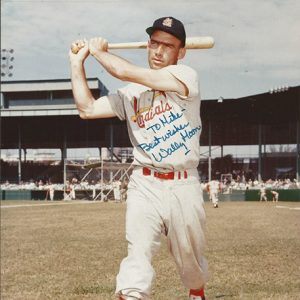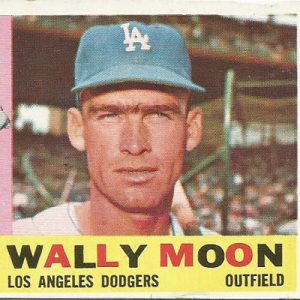calsfoundation@cals.org
Wallace Wade (Wally) Moon (1930–2018)
Wallace Wade (Wally) Moon, named for one of the most prominent football coaches of the era, played twelve seasons of major league baseball. A member of the St. Louis Cardinals and the Los Angeles Dodgers, he won the Rookie of the Year Award in 1954 and made major contributions to the Dodgers’ World Series championship teams in 1959, 1963, and 1965.
Wally Moon was born on April 3, 1930, in Bay (Craighead County) to Henry Albert Moon and Margie Leona Vernon Moon, the middle child in a family of two boys and a girl.
Moon was unusual for his time because when he signed his first professional contract, his father made sure to include a provision that allowed Moon to pursue his college education while paying his dues in the minor leagues. Unlike most players, he did not sign a professional contract right out of high school but instead pursued a college degree at Texas A&M University, where he played both basketball and baseball. Not surprisingly, he became something of an athletic legend at the university. Elected to the school’s Athletic Hall of Fame in 1967, Moon was a two-time letter winner in both basketball and baseball and earned All-Southwest Conference honors in baseball. While his signing with the St. Louis Cardinals organization in 1950 brought his collegiate career to a close, the contract specifically allowed him to leave his minor league team and return to school. Consequently, when Moon finally arrived in the major leagues in 1954 at the age of twenty-four, he had already earned both a bachelor’s and a master’s degree from Texas A&M.
Moon spent four years in the minors, splitting the 1950 season between Houston, Texas, and Omaha, Nebraska, before playing an additional two seasons in Omaha. In 1953, he played for the Triple AAA Rochester Red Wings, the top farm team of the St. Louis Cardinals. With a newborn child at home and a master’s degree in hand, Moon determined that if he did not make the Cardinals roster for the 1954 season, he would retire and pursue a career in education. Although not initially invited to the team’s spring training camp, he was allowed the chance to compete, and he performed so well that the team traded Cardinals icon and future Hall of Famer Enos Slaughter to the New York Yankees to make room for Moon. The trade was not well received by Cardinals fans, and Moon was greeted by boos and cries of “We want Slaughter!” as he came to bat for the first time. Moon quickly quieted the crowd with a home run in his first major league at bat.
Traded to the Los Angeles Dodgers following the 1958 season, Moon played a critical role on the Dodgers’ 1959 World Series–winning team. He finished fourth in the National League’s Most Valuable Player balloting and was also named to play in both All-Star games that season, as he did also in 1957. A versatile fielder with a strong arm, Moon won a Gold Glove Award in 1960 for his outfield play. In addition, he adjusted his swing to take advantage of the short left-field fence in the Dodgers’ temporary home, the Los Angeles Coliseum. Indeed, the left-handed-hitting Moon started to hit them over the short fence in such a way that legendary Dodgers announcer Vin Scully, referencing Moon’s name and the nation’s interest in the emerging space race, started to call them “moon shots.” His overall efforts were impressive, as Moon was an offensive leader on the early Dodgers teams, and he quickly became a fan favorite. His .328 batting average in 1961, a career high, was fourth in the league that season, and he led the league in on-base percentage. While injuries and advancing age led to diminished playing time, Moon was a contributing member of the Dodgers teams that won both the National League pennant and the World Series in both 1963 and 1965. When he retired after the 1965 season, he had a .289 lifetime batting average.
Upon his retirement from major league baseball, Moon joined the faculty of John Brown University in Siloam Springs (Benton County). Except for a one-year sabbatical in 1969, when he returned to the major leagues to serve as the hitting coach for the expansion San Diego Padres, Moon served as coach of the university’s baseball team from 1966 to 1977. He also taught physical education, headed that department, and served as an assistant to the college president. Moon also had a stint as a minor league owner when he led the AA Texas League San Antonio Dodgers from 1976 to 1980.
Moon made several forays into minor league managing, first leading the Prince William Yankees in the Yankees organization in 1987 and the first part of 1988. In 1990–1991, he managed the Frederick Keys in the Orioles organization, leading the 1990 squad to the Carolina League championship.
Moon lived in Bryan, Texas. He and his wife, Bettye, whom he married in 1951, had five children. In 2010, Moon published an autobiography, Moon Shots: Reflections on a Baseball Life. He died on February 9, 2018, in Bryan.
For additional information:
Fimrite, Ron. “St. Louis Cardinals Outfielder Wally Moon.” Sports Illustrated (June 30, 1997).
Moon, Wally, with Tim Gregg. Moon Shots: Reflections on a Baseball Life. San Antonio, TX: Moon Publishing, 2010.
Randall, Mark. “A Helluva Deal: Wally Moon’s 1959 Comeback.” Arkansas Review: A Journal of Delta Studies 46 (April 2015): 16–31.
“Wally Moon.” Baseball-Reference.com. http://www.baseball-reference.com/players/m/moonwa01.shtml (accessed October 26, 2021).
William H. Pruden III
Ravenscroft School
 Recreation and Sports
Recreation and Sports World War II through the Faubus Era, 1941 through 1967
World War II through the Faubus Era, 1941 through 1967 Wally Moon
Wally Moon  Wally Moon
Wally Moon 



Comments
No comments on this entry yet.